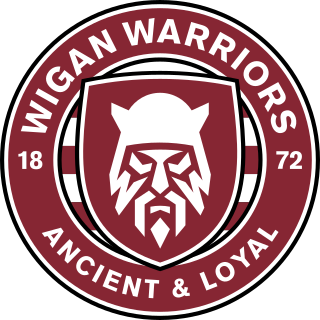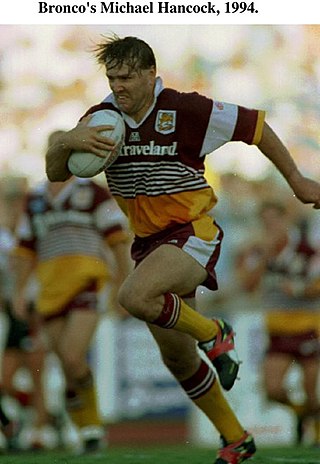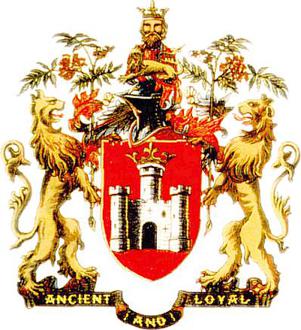
The Brisbane Broncos Rugby League Football Club Ltd., commonly referred to as the Broncos, is an Australian professional rugby league football club based in Brisbane, Queensland. Founded in April 1987, the Broncos currently compete in the National Rugby League (NRL). The club has won six premierships, including two New South Wales Rugby League premierships, a Super League premiership and three NRL premierships. The Broncos have won two World Club Challenges, and four minor premierships in multiple competitions. Prior to 2015, Brisbane had never been defeated in a grand final, and since 1991, the club has failed to qualify for the finals five times. The club is one of the most successful clubs in the National Rugby League since it began in 1998, winning three premierships. The club is one of the most successful clubs in the history of rugby league, having won 59.9% of games played since its induction in 1988, second only to Melbourne Storm with 67.3%.
The World Club Series was an annual rugby league football competition played between clubs from the NRL and the Super League.

The Wigan Warriors are an English professional rugby league club based in Wigan, Greater Manchester. The club competes in the Super League, the top tier of the British rugby league system, and has played its home games at the DW Stadium since 1999. Wigan Warriors are the most successful club in the history of World Rugby League with 126 trophies in total.

The DW Stadium is a multi-use stadium in Robin Park in Wigan, Greater Manchester, England. It is used by Wigan Athletic football club and Wigan Warriors rugby league club. The stadium is owned by The Wigan Football Company.
Steven Renouf is an Australian former professional rugby league footballer who played in the 1980s, 1990s and 2000s. Nicknamed 'the Pearl', he was known as one of the sport's greatest centres. Renouf set numerous records for the Brisbane Broncos club. After spending eleven years with Brisbane, which yielded four premierships, he left Australia to play for English club Wigan Warriors, where he spent two seasons before retiring. He was named in Australia's Indigenous team of the century (1908–2007).
The 1994 Brisbane Broncos season was the seventh in the club's history. As defending Premiers the Broncos competed in the NSWRL's 1994 Winfield Cup competition, finishing the regular season 5th. They then progressed as far as the Semi-finals where a one-point loss to the North Sydney Bears saw them knocked out. Brisbane also hosted and lost the 1994 World Club Challenge to England's Wigan.
Joseph Paul Lydon is an English former professional rugby league footballer and rugby union coach. He played during the 1980s and 1990s as a fullback, wing, centre, or stand-off for Widnes, Wigan and Eastern Suburbs. He also represented Lancashire, and won 30 caps for Great Britain.
The history of the Brisbane Broncos Rugby League Football Club stretches back from their inception in the mid-1980s to the present day. They were introduced to the NSWRL's Winfield Cup premiership in 1988, taking the competition by storm in winning their first six games. The Broncos participated in 18 consecutive finals series from 1992–2009, winning premierships six times, including the 1992 and 1993 NSWRL premierships, the Superleague premiership in 1997 and then the 1998, 2000 and 2006 National Rugby League premierships.

Michael John "Mick" Hancock is an Australian former rugby league footballer who played in the 1980s, 1990s and 2000s. An Australian international and Queensland State of Origin representative wing, he played in the Brisbane Broncos' first five Grand Final victories in 1992, 1993, 1997 Super League, 1998 and 2000. At the time of his retirement from football in Australia in 2000 he held the Broncos' club records for most career appearances. He played out the rest of his career in England with the Salford City Reds and retired in 2002.
Chris Johns is an Australian former rugby league footballer who played in the 1980s and 1990s. He played in the centres, achieving representative honors for Australia and New South Wales. His club football career was spent with the St. George Dragons and Brisbane Broncos, as well as two spells in England, first with Castleford in 1986-87 and then Barrow in 1989–90. After retiring from the playing field, Johns worked in the administration of the Brisbane Broncos and Melbourne Storm clubs.
John Plath is an Australian former rugby league footballer who played in the 1990s. He played in all of the Brisbane Broncos' first four grand final wins from the interchange bench and retired as the most-capped Bronco not to have played representative football.

The 1992 World Club Challenge match was contested by the 1991–92 Rugby Football League season champions Wigan and the 1992 NSWRL season's premiers, the Brisbane Broncos. The match took place on Friday night, 30 October in England, during the 1992–93 Rugby Football League season. It was also played less than a week after the 1992 Rugby League World Cup final. A crowd of 17,764 turned out at Central Park, Wigan for the match which was refereed by New Zealand's Dennis Hale, the same referee as for the World Cup final one week earlier.

The 1994 MMI World Club Challenge was a replay of the 1992 World Club Challenge, with 1993–94 Rugby Football League season champions Wigan facing the 1993 NSWRL season premiers, the Brisbane Broncos, this time in Australia. Wigan were clearly the dominant club in the English game, having won the previous four consecutive Rugby Football League Championships and Challenge Cup tournaments. The Broncos, having won consecutive premierships in 1992 and 1993, were the dominant team in the Australian game at the time. In the World Club Challenge–this time played unusually late in the year–Wigan were looking to get revenge for their loss against Brisbane in the sides' previous encounter, and obtained a strong first-half lead. The English club then survived a second-half comeback from Brisbane and won the match, cementing their position as the world's dominant rugby league club of the period.

The 1987 World Club Challenge was the second game of its kind to be played between Britain's and Australia's domestic rugby league champion clubs. Chairman of Britain's 1986–87 Rugby Football League season champions Wigan, Maurice Lindsay, invited Australia's 1987 NSWRL season premiers, the Manly-Warringah Sea Eagles to Wigan for the game. After this memorable match, the World Club Challenge was decided to be made an official annual feature on the rugby league calendar.

The History of the Wigan Warriors stretches back to the club's foundation in 1872. It was one of the founding members of the Northern Rugby Football Union after the schism from the one code of rugby football in 1895. At the elite competition level, Wigan is the most successful club in the history of British Rugby League, measured by total of trophies won. The club has won 22 Rugby Football League Championships, 20 Challenge Cups and 4 World Club Challenge trophies.

The 2009 World Club Challenge was contested by Super League XIII champions, Leeds Rhinos, competing in their second consecutive World Club Challenge, and 2008 NRL Premiers, the Manly Warringah Sea Eagles. For the first time since 2003, the Australian champions defeated their English counterparts.
Frano Michael Botica is a New Zealand-Croatian rugby union and rugby league coach and former player in both codes, who played in the 1980s and 1990s. He is the head coach of the Philippines sevens team.
1997 in rugby league centered on the Super League II and Australasia's split season.

The 2014 World Club Challenge was the 15th consecutive annual World Club Challenge and was contested by Super League XVIII champions, Wigan Warriors and 2013 NRL Premiers, the Sydney Roosters. The 2014 World Club Challenge marked a return to Australia, 20 years after the last Australian based game. It was played on 22 February 2014 at Allianz Stadium in Sydney. The Roosters won the match 36–14.
The World Club Challenge is an annual rugby league competition between the winners of the Australian National Rugby League and the British Super League, for the de facto club world championship of the sport.











